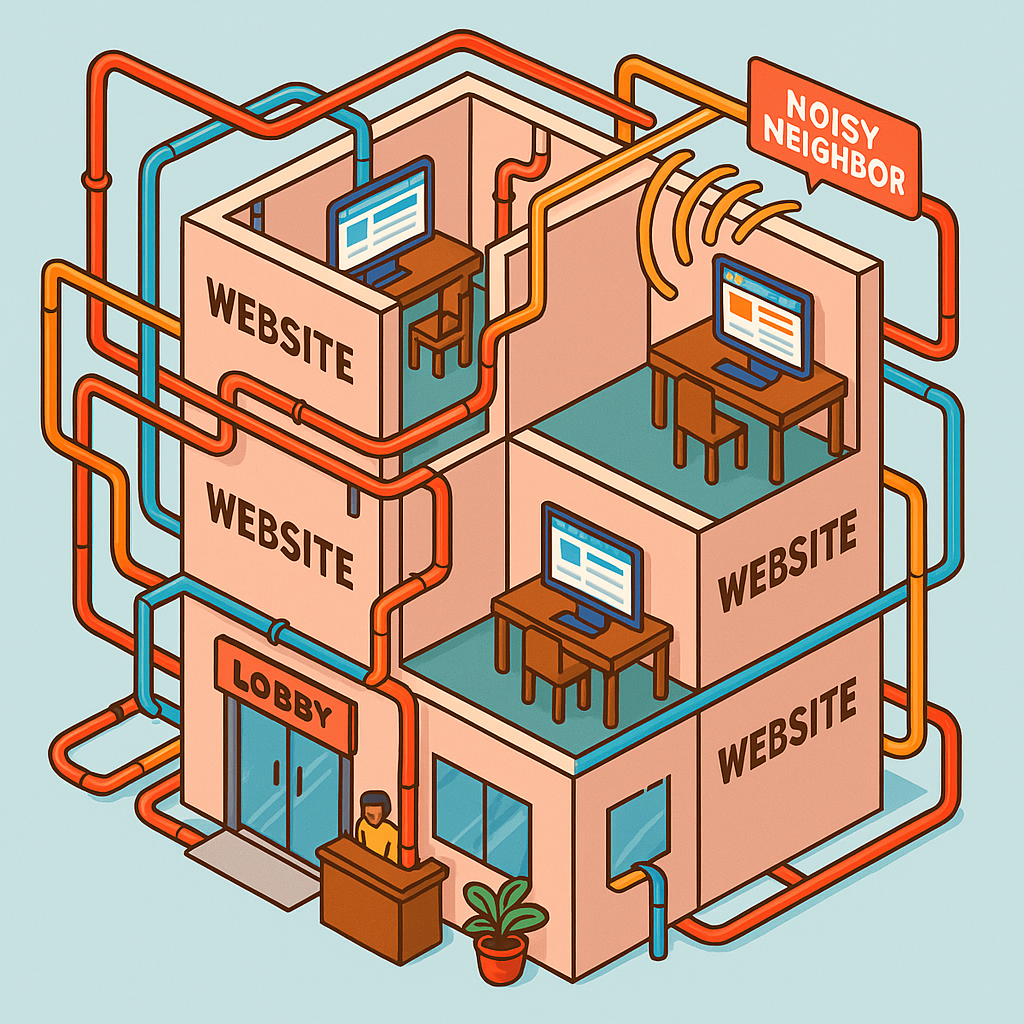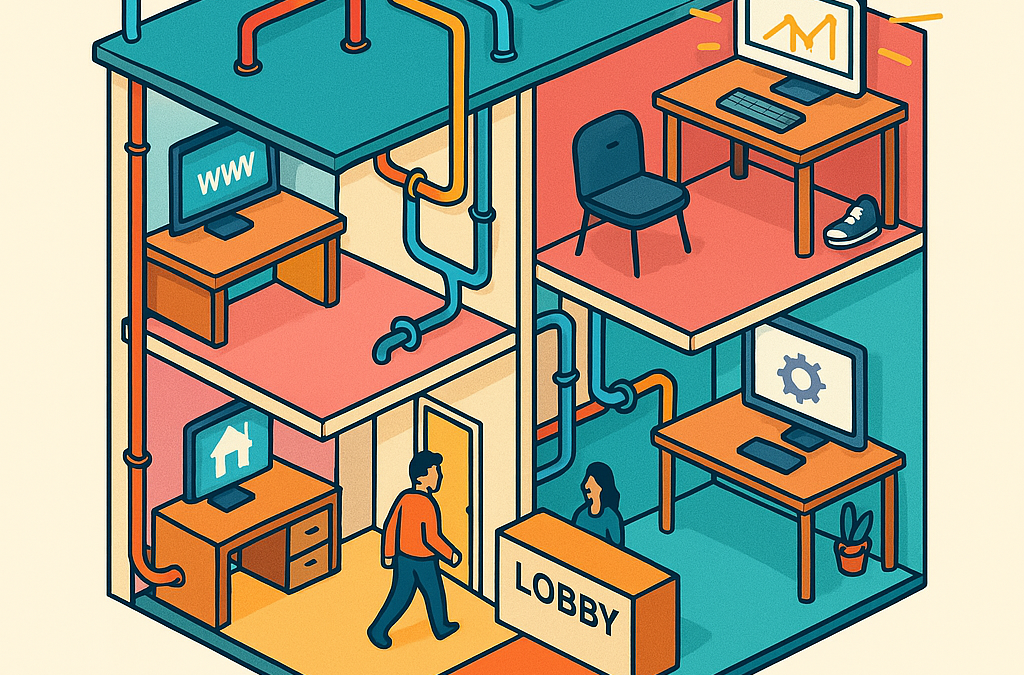Shared hosting is the starter apartment of the web world—cheap, cozy, and fine until you realize the walls are paper-thin and the neighbors are throwing ragers every night. It’s great for launching a blog or a small portfolio, but as your site grows, the cracks start showing. If your website’s throwing up red flags, it might be time to ditch the shared life and step up to something with more muscle—like a VPS. Here are five telltale signs you’ve outgrown the dorm-room vibes of shared hosting, backed by some cold, hard facts.

1. Your Site’s Moving Like a Sloth on Sedatives
Ever click your own site and wonder if it’s still 1999? Slow load times aren’t just annoying—they’re a death knell. Google’s research shows 53% of mobile users ditch a page if it takes over 3 seconds to load. Shared hosting pools CPU, RAM, and bandwidth across dozens—sometimes hundreds—of sites on one server. When your neighbor’s e-commerce sale pops off or someone’s running a bloated WordPress install, you’re left scraping the bottom of the resource barrel. A 2022 study by Uptime Institute found that shared hosting environments often see performance dips of 30-50% during peak traffic. If your site’s lagging behind the competition, it’s not just embarrassing—it’s losing you business.
2. Crashes Are Your Uninvited Plus-One
Nothing says “professional” like a 500 Internal Server Error greeting your visitors. Shared hosting is a house of cards—one misbehaving tenant can crash the whole block. Maybe it’s a rogue script, a DDoS attack on someone else, or just too many sites sucking up the juice. According to a 2023 Pingdom report, shared hosting downtime averages 1-2% annually—doesn’t sound bad until you realize that’s 3-7 days of your site being MIA over a year. For an online store pulling $10,000 monthly, that’s hundreds in lost sales. If crashes are your new normal, you need a setup that doesn’t make you collateral damage.
3. You’re Begging for More Control (and Getting Denied)
Shared hosting is like renting from a control-freak landlord. Want to bump PHP to 8.1? Install a custom security module? Tweak Apache settings? Sorry, pal—hands off. Most shared plans lock you into a one-size-fits-all config, with 70% of providers offering zero root access, per Hosting Tribunal’s 2023 survey. That’s fine for a static HTML site, but if you’re running a dynamic app, e-commerce platform, or anything custom, you’re handcuffed. VPS hosting, by contrast, hands you the keys—full root access, custom software stacks, and the freedom to optimize. If you’re itching to break free from the presets, shared hosting’s holding you back.
4. Security’s a Nightmare You Can’t Wake Up From
Shared servers are a hacker’s playground. One weak link—like a site with an outdated plugin—can expose everyone. A 2021 Sucuri report found that 43% of hacked WordPress sites were on shared hosting, often due to cross-site contamination. If you’re handling customer data, payments, or anything sensitive, that’s a ticking time bomb. The average cost of a data breach hit $4.45 million in 2023, per IBM—way more than a VPS upgrade. Shared hosting’s “good enough” security (think basic firewalls and maybe some malware scans) doesn’t cut it when stakes are high. A VPS isolates your site, so someone else’s mess isn’t your problem. If you’re losing sleep over vulnerabilities, it’s time to move out.
5. Traffic’s Booming—or You’re Planning for It
Dreaming of viral fame or scaling your business? Shared hosting’s got a leash on you. Most plans cap bandwidth, CPU, and storage—sometimes as low as 10GB or 100,000 monthly visitors. Hit those limits, and you’re either throttled or slapped with overage fees. A Backblaze study pegged average shared hosting bandwidth at 50-100GB monthly, while a single high-res video site could chew through that in days. Even if your traffic’s modest now, growth means planning ahead. VPS hosting scales with you—dedicated resources, no arbitrary caps. If you’re bumping up against limits or prepping for a glow-up, shared hosting’s a straitjacket.
Why This Matters—and What’s Next
The numbers don’t lie: 68% of small businesses still start on shared hosting, per Web Hosting Professor, but half outgrow it within two years. It’s not just about performance—it’s about credibility. Customers don’t care why your site’s down or slow; they just bounce. A VPS isn’t just an upgrade; it’s a lifeline. You get dedicated CPU, RAM, and storage—think of it as moving from a bunk bed to your own pad. No noisy neighbors, no resource fights, just your site running like it should.
So, take a hard look. If your load times suck, downtime’s routine, control’s a pipe dream, security’s shaky, or growth’s on the horizon, shared hosting’s done its job—it got you started. Now it’s time to level up. A VPS gives you the power, flexibility, and peace of mind to stop surviving and start thriving. Your website’s not a kid anymore. Stop cramming it into a dorm and give it room to breathe.
Power Your Projects with vpszen.com VPS Solutions
Looking for reliable hosting to run your Linux servers and host your next big project? VpsZen.com has you covered with top-tier VPS options tailored to your needs.
Choose from ARM64 VPS Servers for energy-efficient performance, or Root VPS Servers for virtual servers with dedicated resources.

